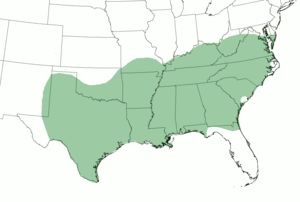Southern American English or Southern U.S. English is a regional dialect[1][2] or collection of dialects of American English spoken throughout the Southern United States, though concentrated increasingly in more rural areas, and spoken primarily by White Southerners.[3] In terms of accent, its most innovative forms include southern varieties of Appalachian English and certain varieties of Texan English.[4] Popularly known in the United States as a Southern accent or simply Southern,[5][6][7] Southern American English now comprises the largest American regional accent group by number of speakers.[8] Formal, much more recent terms within American linguistics include "Southern White Vernacular English" and "Rural White Southern English".[9][10]
A diversity of earlier Southern dialects once existed: a consequence of the mix of English speakers from the British Isles (including largely English and Scots-Irish immigrants) who migrated to the American South in the 17th and 18th centuries, with particular 19th-century elements also borrowed from the London upper class and enslaved African-Americans. By the 19th century, this included distinct dialects in eastern Virginia, the greater Lowcountry area surrounding Charleston, the Appalachian upcountry region, the Black Belt plantation region, and secluded Atlantic coastal and island communities.
Following the American Civil War, as the South's economy and migration patterns fundamentally transformed, so did Southern dialect trends.[11] Over the next few decades, Southerners moved increasingly to Appalachian mill towns, to Texan farms, or out of the South entirely.[11] The main result, further intensified by later upheavals such as the Great Depression, the Dust Bowl and perhaps World War II, is that a newer and more unified form of Southern American English consolidated, beginning around the last quarter of the 19th century, radiating outward from Texas and Appalachia through all the traditional Southern States until around World War II.[12][13] This newer Southern dialect largely superseded the older and more diverse local Southern dialects, though it became quickly stigmatized in American popular culture. As a result, since around the 1950s and 1960s, the notable features of this newer Southern accent have been in a gradual decline, particularly among younger and more urban Southerners, though less so among rural white Southerners.

Despite the slow decline of the modern Southern accent,[16] it is still documented as widespread as of the 2006 Atlas of North American English. Specifically, the Atlas definitively documents a Southern accent throughout Virginia, North Carolina, South Carolina (except Charleston), Georgia (though not among some Atlantan speakers), Alabama, Mississippi, Tennessee, Kentucky, Arkansas, Louisiana (alongside Cajun and New Orleans accents), southern West Virginia, the Jacksonville area of northern Florida, the Springfield area of southern Missouri, and much of Texas.[17][a] Other 21st-century scholarship further includes within the dialect region southern Maryland, eastern and southern Oklahoma, central West Virginia, the rest of northern Florida and southern Missouri, and southeastern New Mexico.[18][19]
The Atlas, furthermore, documents the South Midland accent as sharing key features with the Southern accent but to a weaker extent; these features extend across all of Texas, Oklahoma, and West Virginia as well as eastern and central Kansas, southern Missouri, southern Indiana, southern Ohio, and possibly southern Illinois.[20][18] African-American accents across the United States have many common points with Southern accents due to the strong historical ties of African Americans to the South.
In the United States, there is a general negative stigma surrounding the Southern dialect. Non–Southern Americans tend to associate a Southern accent with lower social and economic status, cognitive and verbal slowness, lack of education, ignorance, bigotry, or religious or political conservatism,[21] using common labels like "hick", "hillbilly",[22] or "redneck accent".[23] Meanwhile, Southerners themselves tend to have mixed judgments of their accent, some similarly negative but others positively associating it with a laid-back, plain, or humble attitude.[24] The accent is also associated nationwide with the military, NASCAR, and country music. Furthermore, non–Southern American country singers typically imitate a Southern accent in their music.[23] The sum of negative associations nationwide, however, is the main presumable cause of a gradual decline of Southern accent features, since the middle of the 20th century onwards, particularly among younger and more urban residents of the South.[16]
In a study of children's attitudes about accents published in 2012, Tennessee children from five to six were indifferent about the qualities of persons with different accents, but children from Chicago were not. Chicago children from five to six (speakers of Northern American English) were much more likely to attach positive traits to Northern speakers than Southern ones. The study's results suggest that social perceptions of Southern English are taught by parents to children and exist for no biological reason.[25]
In 2014, the US Department of Energy at the Oak Ridge National Laboratory in Tennessee offered a voluntary "Southern accent reduction" class so that employees could be "remembered for what they said rather than their accents". The course offered accent neutralization through code-switching. The class was canceled because of the resulting controversy and complaints from Southern employees, who were offended by the class since it stigmatized Southern accents.[26]
Most of the Southern United States underwent several major sound chang